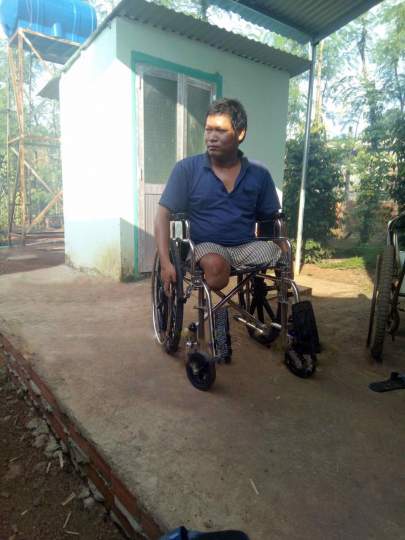VNAH
Since 1991, Vietnam Assistance for the Handicapped (VNAH)- a U.S. based NGO - has worked with international and local partners to support Vietnamese with disabilities and disadvantaged children to improve their quality of life and societal integration. VNAH also provided technical assistance for the development and implementation of national and sub-national disability policies and programs, and capacity building for local service providers.
Major results as of December 2023:
80,000+persons with disabilities have benefited from direct assistance in rehabilitation, assistive devices, education, vocational training, jobs/livelihood assistance, accessible latrines and clean water.
22,000 local service providers, including rehabilitation doctors and therapies, social workers and caregivers have been trained and empowered to better support persons with disabilities.
140 schools, 29 rehabilitation units and 5 vocational training schools have been built, set up, equipped and empowered to improve access to services for target beneficiaries.
Millions of persons with disabilities impacted by policies through our technical assistance for:
- Vietnam first national Disability Law.
- National and provincial action plans and programs for disability and rehabilitation services.
- Technical procedures and practice guidelines that expanded services and insurance coverage for rehabilitation services.
- First national accessibility codes and standards for public construction, transport and ICT.
- The Disability Information System which has been adopted in the national health system and being implemented in over 30 provinces.
- Establishment of inter-agency National Coordinating Council on Disability (NCCD, a predecessor of NCD), national Vietnam Federation for Disabilities and over 10 disabled people organizations.
Training curriculum and training of trainers in: barrier-free access designs, social work with people with disabilities, occupational and physical therapies and vocational rehabilitation.
Our major donors and partners: Ministry of Health, Ministry of Labor, Invalids and Social Affairs of Vietnam and their provincial departments, USAID, ASHA, USDOL, Disabled American
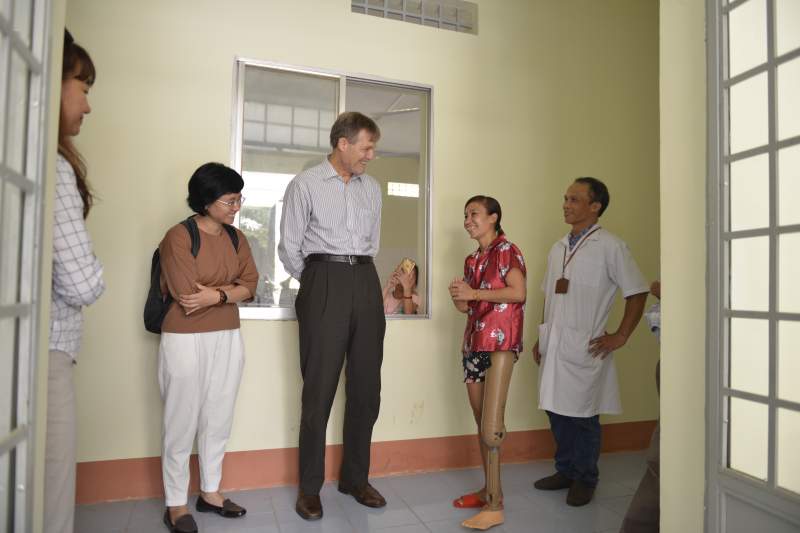
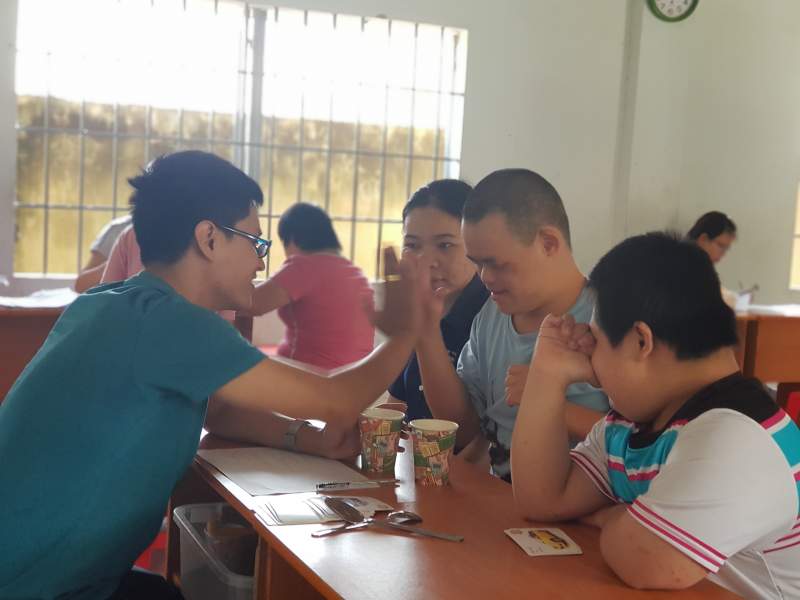
5,800 persons with disabilities and disadvantage youth have gained vocational skills and jobs:
Through projects that provided vocational skills training, job placement services, vocational rehabilitation, business start up and self-employment as well as supports to employment service centers and networks that promoted inclusive employment.
19,200 service providers have been trained:
VNAH supported career and capacity building training for hundreds of rehabilitation doctors and therapists, inclusive education teachers, social work case managers, care-givers, communal health providers, construction and transportation regulators as well as social social services providers and administrators so that they can better support people with disabilities. VNAH also supported the establishment, provision of equipment and empowerment of new services, including 25 rehabilitation departments/units in public hospitals, 5 Vocational Training Centers/Schools, 10 Employment Service Centers and co-founding the Blue Ribbon Employer’s Council (BREC) that had over 250 business members who have offered thousands of jobs to people with disabilities.
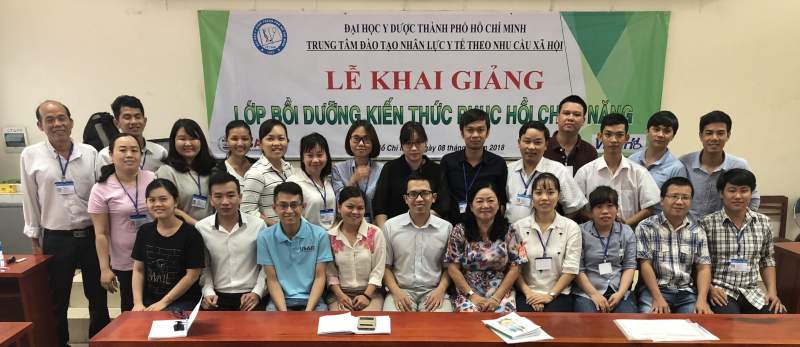
Millions of persons with disabilities have benefited from new policies made with VNAH supports:
VNAH’s technical assistance and other supports to Vietnamese Government partners attributed to the development and enactment of important disability-related policies and programs, such as:
- Vietnam national Disability Law.
- National plan of action for implementation of CRPD
- Action plans for disability and rehabilitation services at national and provincial levels.
- Policy and technical procedures for health insurance coverage for rehabilitation services
- National accessibility codes and standards for public construction, transport and ICT.
- Policy on case management support for persons with disabilities
- Rehabilitation provisions in the revised Law on examination and treatment, Vocational Training Law and Labor Code
- Disability Information System (DIS), which is implemented in the national health system.
- Establishment of inter-agency National Coordinating Council on Disability (NCCD, a predecessor of NCD), national Vietnam Federation for Disabilities (VFD) and over 10 disabled people organizations.
Training Curriculum and training of trainers:
VNAH and partners have developed training materials, curriculum and training of trainers in areas including barrier-free access designs, social work with people with disabilities, occupational therapy and vocational rehabilitation. These training materials/programs are being taught to graduate and undergraduate students as well as provincial and community services providers.
Support education and community development in rural, mountainous areas:
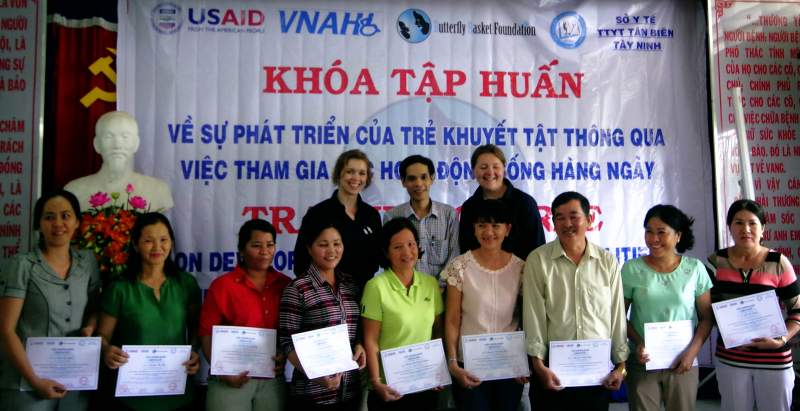
VNAH built more than 140 elementary schools and boarding houses in rural and ethnic minority communities in Central Highland, Central Coast and Northern Mountainous areas of Vietnam. We also supported training of teachers, mid-wife and installation of
drinking water systems in remote villages.
Major International donors and partners:
VNAH receives support from, and work with major organizations, including:
- U.S. Agency for International Development (USAID)
- The Leahy War Victims Fund
- U.S. Department of Labor, U.S State Department
- American Schools and Hospitals Abroad
- The Freeman Foundation
- The Ford Foundation
- The Nippon Foundation (Japan), the Sasakawa Peace Foundation (Japan)
- Asian Education Friendship Association (Japan)
- JICA, Irish AID
- The Aspen Institute, Development Alternatives Inc.
- Disabled American Veterans, the American Legion
- Canada Executive Service Organization (CESO)
- Australian Volunteer International (AVI)
- Butterfly Basket Foundation (BBF)
- Chino Cienega Foundation, Grapes for Humanity Global Foundation
- Curtin University, John Hopkins University Hospital, Kennedy Krieger Institute
- IBM, Pragmatics Corp, NIKE, and many other organizations and individuals
